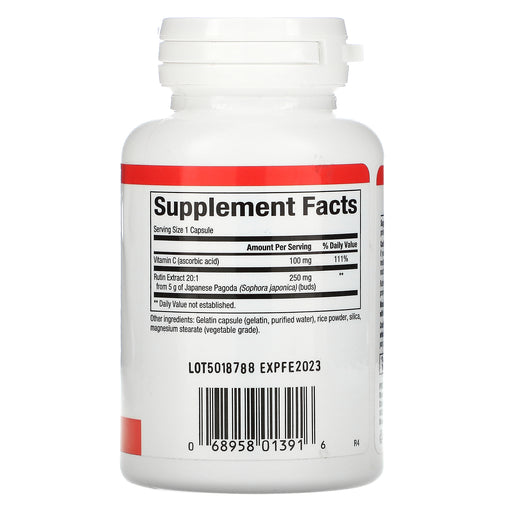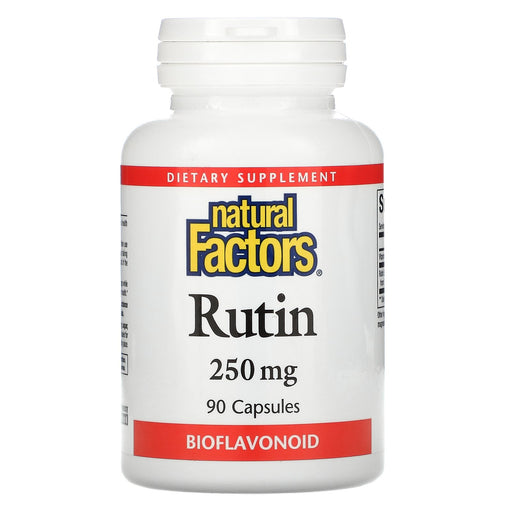
Unleash the Antioxidant and Anti-Inflammatory Power of Rutin for Optimal Health
Rutin, also known as rutoside or quercetin-3-O-rutinoside, is a potent bioflavonoid found naturally in various plants, including buckwheat, apples, and citrus fruits. With its powerful antioxidant and anti-inflammatory properties, rutin supplements offer a natural way to support cardiovascular health, strengthen blood vessels, and promote overall well-being.
What is Rutin?
Rutin is a type of flavonoid glycoside, composed of the flavonoid quercetin and the disaccharide rutinose. It is a yellow crystalline solid that is slightly soluble in water and has a bitter taste. Rutin is found in a variety of plants, particularly in the flowers and leaves, and has been used in traditional medicine for centuries to treat various ailments.
As a potent antioxidant, rutin helps protect cells from damage caused by harmful free radicals and oxidative stress. It also possesses anti-inflammatory properties, helping to modulate the body's inflammatory response and reduce inflammation in various tissues.
Benefits of Rutin Supplementation
Incorporating rutin supplements into your health regimen may offer several potential benefits, including:
- Cardiovascular Health Support: Rutin has been shown to support cardiovascular health by promoting healthy blood circulation, reducing inflammation in blood vessels, and helping to maintain healthy cholesterol levels.
- Blood Vessel Strength: Rutin helps strengthen and improve the elasticity of blood vessels, particularly capillaries, which may help reduce the risk of bruising, spider veins, and varicose veins.
- Antioxidant Protection: As a potent antioxidant, rutin helps neutralize harmful free radicals and reduces oxidative stress, protecting cells and tissues from damage. This antioxidant activity may help support overall health and longevity.
- Anti-Inflammatory Effects: Rutin's anti-inflammatory properties may help reduce inflammation throughout the body, which is associated with various chronic health conditions, such as heart disease, diabetes, and arthritis.
- Skin Health: The antioxidant and anti-inflammatory effects of rutin may help protect the skin from damage caused by UV radiation, pollution, and other environmental stressors, promoting a healthy, youthful complexion. Rutin's ability to strengthen blood vessels may also help reduce the appearance of dark circles and puffiness under the eyes.
Choosing the Best Rutin Supplement
When selecting a rutin supplement, consider the following factors to ensure you choose a high-quality product that meets your needs:
- Purity and Potency: Look for supplements that provide a standardized amount of rutin, typically ranging from 250-500 mg per serving, and are free from contaminants and artificial additives.
- Bioavailability: Rutin has relatively low bioavailability when taken orally, so choose supplements that use advanced delivery systems, such as liposomal or phytosomal technology, to enhance absorption and utilization by the body.
- Synergistic Ingredients: Consider supplements that combine rutin with other antioxidant or anti-inflammatory compounds, such as vitamin C, quercetin, or bromelain, for a more comprehensive approach to health and wellness.
- Brand Reputation: Select supplements from reputable brands with a history of producing high-quality, science-backed products and a commitment to transparency and safety.
- Third-Party Testing: Look for supplements that have been third-party tested for purity, potency, and safety, ensuring you receive a high-quality product.
Maximizing the Benefits of Rutin Supplements
To get the most out of your rutin supplement, consider the following tips:
- Follow Dosage Instructions: Always adhere to the recommended dosage on the product label, and consult with your healthcare provider before starting any new supplement regimen, especially if you have pre-existing health conditions or are taking medications.
- Pair with a Balanced Diet: While rutin supplements can provide valuable antioxidant and anti-inflammatory support, they should be used in conjunction with a balanced, nutrient-dense diet rich in fruits, vegetables, whole grains, and healthy fats.
- Stay Hydrated: Drink plenty of water throughout the day to support optimal nutrient absorption and overall health.
- Store Properly: Keep your rutin supplement in a cool, dry place, away from direct sunlight and moisture, to maintain its potency and stability.
- Be Patient: The benefits of rutin supplementation may take time to become noticeable, as the antioxidant and anti-inflammatory effects work to support health and well-being from within. Consistent, long-term use is often necessary to experience the full range of benefits.
Rutin and Synergistic Nutrients
Rutin's antioxidant and anti-inflammatory effects can be enhanced when combined with other synergistic nutrients, such as:
- Vitamin C: Rutin and vitamin C work together to support collagen production, blood vessel strength, and overall antioxidant protection. Vitamin C also enhances the bioavailability and absorption of rutin in the body.
- Quercetin: Rutin is a glycoside of quercetin, and these two flavonoids have complementary antioxidant and anti-inflammatory effects. Together, they help support cardiovascular health, immune function, and overall well-being.
- Bromelain: This enzyme, derived from pineapple, has potent anti-inflammatory properties that can enhance the effects of rutin in reducing inflammation throughout the body.
- Vitamin E: As a fat-soluble antioxidant, vitamin E works synergistically with rutin to protect cell membranes from oxidative damage and support overall health.
Harness the Power of Rutin for Optimal Health and Vitality
If you're looking to support cardiovascular health, strengthen blood vessels, and promote overall well-being, rutin supplements may be a valuable addition to your wellness routine. By harnessing the potent antioxidant and anti-inflammatory properties of this powerful bioflavonoid, you can help protect your cells, reduce inflammation, and optimize your health from the inside out.
Witness the potential of rutin supplementation for yourself by exploring our curated selection of high-quality rutin supplements. With a commitment to purity, efficacy, and your individual needs, Health Orchard is here to support you on your journey toward optimal health and vitality.
Frequently Asked Questions about Rutin
1. What is the supplement rutin good for?
Rutin, a bioflavonoid found in various plants, is a dietary supplement with several potential health benefits:
- Antioxidant properties: Rutin may help protect cells from oxidative stress and inflammation.
- Vascular health: Rutin may support the strength and integrity of blood vessels, potentially reducing the risk of bleeding and bruising.
- Circulation: Rutin may improve circulation and reduce the risk of blood clots.
- Joint health: Rutin's anti-inflammatory properties may help alleviate symptoms of arthritis and other joint disorders.
- Blood sugar management: Some studies suggest rutin may help regulate blood sugar levels and improve insulin sensitivity.
2. What is the best source of rutin?
Rutin is found naturally in various plant-based sources, including:
- Buckwheat: One of the richest dietary sources of rutin, particularly in the seeds and leaves.
- Citrus fruits: Oranges, grapefruits, lemons, and limes contain rutin, especially in the peel and white inner skin.
- Apples: The skin of apples is a good source of rutin.
- Berries: Blackberries, mulberries, and cranberries contain rutin.
- Asparagus: Rutin is found in asparagus, particularly in the stems.
- Tea: Black, green, and oolong tea contain rutin.
- Supplements: Rutin is available in supplement form, often derived from buckwheat or Japanese pagoda tree flowers.
3. What are the benefits of rutin Tablet?
Rutin tablets, a dietary supplement containing the bioflavonoid rutin, may offer several potential health benefits:
- Antioxidant support: Rutin may help protect cells from oxidative stress and inflammation, which are associated with various chronic diseases.
- Vascular health: Rutin may support the strength and integrity of blood vessels, potentially reducing the risk of bleeding, bruising, and varicose veins.
- Circulation: Rutin may improve circulation and reduce the risk of blood clots, which can contribute to heart health.
- Joint health: Rutin's anti-inflammatory properties may help alleviate symptoms of arthritis and other joint disorders.
- Blood sugar management: Some studies suggest rutin may help regulate blood sugar levels and improve insulin sensitivity, which may be beneficial for those with or at risk of diabetes.
4. Does rutin affect the liver?
Rutin, a dietary supplement, is generally considered safe and well-tolerated, with no significant adverse effects on the liver when taken in recommended doses. In fact, some studies suggest that rutin may have potential hepatoprotective (liver-protecting) properties:
- Antioxidant effects: Rutin's antioxidant properties may help protect liver cells from oxidative stress and inflammation, which can contribute to liver damage.
- Reduction of liver enzymes: Some animal studies have shown that rutin supplementation may help reduce elevated liver enzymes, which are markers of liver damage or inflammation.
- Protection against toxins: Rutin may help protect the liver from the harmful effects of certain toxins, such as alcohol or heavy metals.
5. Is rutin safe to take daily?
Rutin, a dietary supplement, is generally considered safe for daily consumption when taken in recommended doses. The typical dosage of rutin ranges from 250-500 mg per day, although some studies have used doses up to 2,000 mg per day without significant adverse effects.
However, it's important to note that individual tolerances may vary, and some people may experience side effects, such as:
- Digestive discomfort (e.g., nausea, bloating, diarrhea)
- Headache
- Skin rash or itching (rare)
If you experience any persistent or severe side effects, discontinue use and consult with a healthcare professional.
6. Is rutin good for kidneys?
Rutin, a dietary supplement with antioxidant and anti-inflammatory properties, may offer some potential benefits for kidney health:
- Reduction of oxidative stress: Rutin may help protect kidney cells from oxidative damage, which is associated with the development and progression of kidney disease.
- Anti-inflammatory effects: Rutin's anti-inflammatory properties may help reduce inflammation in the kidneys, which can contribute to kidney damage and dysfunction.
- Improved kidney function markers: Some animal studies have shown that rutin supplementation may help improve markers of kidney function, such as blood urea nitrogen (BUN) and creatinine levels.
- Protection against toxins: Rutin may help protect the kidneys from the harmful effects of certain toxins, such as heavy metals or drugs that can cause kidney damage.
However, it's important to note that more human research is needed to fully understand rutin's effects on kidney health, and individual results may vary.
7. What are the disadvantages of rutin?
While rutin, a dietary supplement, is generally considered safe and well-tolerated, there are some potential disadvantages and side effects to be aware of:
- Digestive discomfort: Some people may experience digestive issues, such as nausea, bloating, or diarrhea, when taking rutin supplements.
- Headache: Rutin may cause headaches in some individuals, particularly at higher doses.
- Skin reactions: In rare cases, rutin may cause skin rash or itching.
- Interactions with medications: Rutin may interact with certain medications, such as blood thinners and anticoagulants, potentially increasing the risk of bleeding. It may also interfere with the absorption or metabolism of other drugs.
- Limited long-term safety data: While rutin is generally considered safe for short-term use, there is limited data on its long-term safety and potential side effects when taken in high doses or for extended periods.
- Not suitable for everyone: Rutin may not be appropriate for individuals with certain health conditions, such as bleeding disorders or scheduled for surgery, due to its potential effects on blood clotting.
If you experience any persistent or severe side effects, discontinue use and consult with a healthcare provider.










